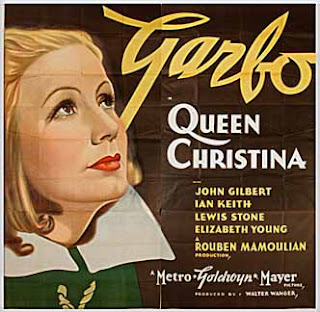Queen Christina
Greta Garbo delivers a fine, powerful performance as the real life Queen Christina of Sweden, who abdicated the crown. In this film, she abdicates for the love of a Spaniard, although that doesn't seem to be the true story. It makes for a good movie, though.
Christina becomes queen as a child when her father, the king, dies in battle during the Thirty Years' War. He had brought her up as a boy, so she's ready for responsibility, though is guided by a wise chancellor (Lewis Stone).
Flash forward to her as an adult, when a cousin wins a major battle, becomes a hero, and is pushed at her for a husband. She's carrying on with the treasurer (Ian Keith) but he turns out to be a rat.
One day while out riding, dressed in men's clothes (which apparently she did often) she meets the Spanish envoy (John Gilbert). They share a room at the local inn, and he doesn't realize he's a she until her figure is revealed upon the removal of her overcoat. It's a stretch to imagine that everyone thinks Garbo is a man, given those eyelashes and cheekbones, but we can play along. We can certainly buy Gilbert immediately falling into bed with her. Since this is 1933, and pre-code, it's plain what the two are up to during a snowstorm that keeps them inn-bound for five days.
Christina is a forward-thinking monarch, interested more in the arts than war. When the parliament and the populace pressure her to get rid of Gilbert and marry her cousin, she pulls a surprising move, and like a much more likable Edward VIII, gives up the crown instead. It's a nice profile in courage, and the closing shot, of her on a ship, leaving her country, her hair blowing in the wind, is a classic touch.
Queen Christina was directed by the great Rouben Mamoulian, and there isn't a bad shot in the film. A famous sequence has Garbo walking around the room at the inn, one long, slow take, as she memorizes the things in the room. Garbo here uses her silent-film technique of registering emotion just with the face.
John Gilbert was Garbo's former lover, and co-star in several silent films. His career dipped badly after the talkies (this didn't have to do with his voice, which was fine), and Garbo surely was behind him getting this role. He died in 1936.
Christina becomes queen as a child when her father, the king, dies in battle during the Thirty Years' War. He had brought her up as a boy, so she's ready for responsibility, though is guided by a wise chancellor (Lewis Stone).
Flash forward to her as an adult, when a cousin wins a major battle, becomes a hero, and is pushed at her for a husband. She's carrying on with the treasurer (Ian Keith) but he turns out to be a rat.
One day while out riding, dressed in men's clothes (which apparently she did often) she meets the Spanish envoy (John Gilbert). They share a room at the local inn, and he doesn't realize he's a she until her figure is revealed upon the removal of her overcoat. It's a stretch to imagine that everyone thinks Garbo is a man, given those eyelashes and cheekbones, but we can play along. We can certainly buy Gilbert immediately falling into bed with her. Since this is 1933, and pre-code, it's plain what the two are up to during a snowstorm that keeps them inn-bound for five days.
Christina is a forward-thinking monarch, interested more in the arts than war. When the parliament and the populace pressure her to get rid of Gilbert and marry her cousin, she pulls a surprising move, and like a much more likable Edward VIII, gives up the crown instead. It's a nice profile in courage, and the closing shot, of her on a ship, leaving her country, her hair blowing in the wind, is a classic touch.
Queen Christina was directed by the great Rouben Mamoulian, and there isn't a bad shot in the film. A famous sequence has Garbo walking around the room at the inn, one long, slow take, as she memorizes the things in the room. Garbo here uses her silent-film technique of registering emotion just with the face.
John Gilbert was Garbo's former lover, and co-star in several silent films. His career dipped badly after the talkies (this didn't have to do with his voice, which was fine), and Garbo surely was behind him getting this role. He died in 1936.



Comments
Post a Comment